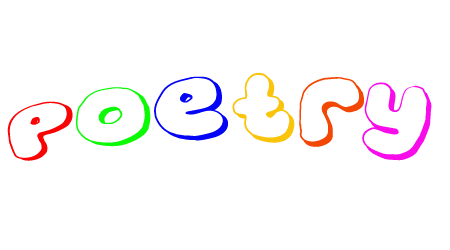HUZAIFA PANDIT
Poetry, Aristotle said, represents the universal ideal while his predecessor termed poets as light winged creatures who culled milk from enchanted rivers.
Over the years philosophers, poets and critics have debated on the question: What constitutes a poem? Is it the imagery, the rhyme or the rhythm? Or is it the emotion, the subtle passion and the thought that makes a poem? Well centuries have been woven into the tapestry of time and no universal answer has been found to the question. Perhaps we shall never arrive at the answer for as long as men continue to have varied natures and tastes we will have works that cater to their notion of the poem. Yet it would be an interesting and rather an intriguing exercise on what constitutes a poem. Usually it exists as separate from prose though the blurring of the boundary between by the prose poem has rather lent further problems in attempting such a classification. Then along comes a Joyce or Rushdie whose prose is sheer poetry for its musicality and intensity of emotion that it invokes. However, one might argue that despite such a blurring the prefix of poetry is still attached to such a mingling. Therefore without much ado let us try and explore what sets the poem apart from prose.
The first obvious difference would be line breaks. The line is the basic device that distinguishes poetry from prose. A poem is not concerned with grammatical or syntactical correctness. The rules of grammar do not apply to poetry. The line focuses on being a unit of meaning whether it is complete or incomplete. It determines whether the poem shall strike a harsh note or strike a musical melodious note. But the purpose of the line is not only limited to a revealing sense for it foists the words upon us a carefully crafted sample of consciousness submitted for our attention. Unlike prose where we can skim over a few lines in a poem each line is integral to be poem for each line places the reader in a particular framework: a breaking away at the end of a clause the grammatical pause indicates a sense of completeness. On the other hand breaking away in the midst of a clause indicates a sense of incompleteness, a notion that the normal progression contains spaces where a pause can be enforced. The pause is of course an important tool for it is a hint that the space is impregnated with meaning of consequence.
Melody: a poem can contain a sense of rhyme and rhythm. While this largely began as a memory aid it later developed into aextension of meaning and sense, it still evokes extreme and mixed reactions. Blank verse and free verse – their evolution and acceptance proves that this part is not integral to a poem. However, if used judiciously in the form of alliterative or onomatopoeic words it can lend a poem a sense of melody.
However apart from these formal markers exists a separate world- that which defines the poem itself. A poem is transformed into a poem by the economy and intensity of expression. The primary distinguishing feature between a poem is the emotion it packs into a line that allows not only for multitudinous interpretation that strikes deep into the tenor of the heart to produce a delightful rhapsody that keeps one’s senses in suspension. A poem portrays a state of emotion by suggestion rather than elaboration. Poetry draws the reader in by its suggestiveness – an invitation, an irresistible invitation to explore the underlying texture and taste the pure flavour of emotion. A poem does so by rooting itself in a unique perceptive state where the reader is released from the confines of normative meaning and deduction. It propels the reader into a space between the words where meanings remain in a continuous flux- the only criterion is the reader’s perception of the space. Like water it imitates the form of the vessel of emotion that the reader feels and the meaning he discerns. This is true to some extent of prose too but a prose places great restrictions on this interpretative freedom. Prose by virtue of its tendency to elucidate and relying on logical constructions robs the words of their suggestive element to a large extent.
A poem arouses the sense like the fleeting fragrance that teases the senses by the promise it holds of a seductive beauty. The mysterious novelty and charm that is embedded in the poem’s multiple expressions – each expression a separate universe of its own, complete in all respects and self satisfied without any reliance on its precedent or succeeding image. This is the major difference between prose and poetry. Prose demands a context to derive its meaning but poetry transcends this limitation with a graceful ease – like an artist’s swirling brush on the canvas painting his imagination in the colours of existence that will long outlive the painter-poet. Prose is like a symphony – clear in its distinction between the genres as romantic, factual or historical. Even if a blending is enacted for example a historical romance the flavour of the work is evident and rarely ambiguous. Not so with poetry – a poem resists interpretation into a clear water tight category.
The poet himself does not often realize what flows through him when he composes a poem. This is not to revive the old Platonian argument of inspiration flowing through the poet and thus his being a mere imitator of no value. Rather what is meant is that a poet starts with a certain notion of an event – an impression as it were and tries to transform into words. However many times the poem charts its own course like a lover drawn on by the fragrance of his beloved. And when the final edifice is built the poet himself is pleasantly surprised. He marvels at the journey that the words have charted and the reader imposes his own journey on the poem. We arrive here at an important distinction between poetry and prose. As a resultant a successful poem is a collage of impression interpenetrating each other that dazzles the senses by its variety.
Author is presently pursuing his Masters in English Literature from Pune University, Maharashtra.

















I cannot quite remember how much I paid but I think it was about £6.
This service makes F&D speaker systems one of the most sought after products in the entertainment industry.
On average, it can take up to 4 to 6 weeks before
interested parties will contact you.